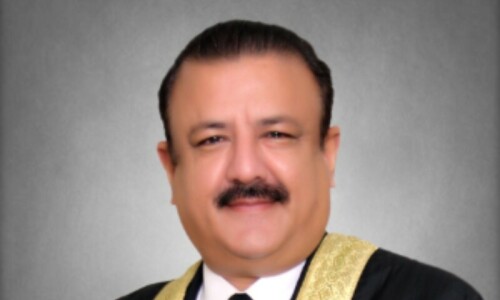THE assassination of JUI-F’s Sindh secretary-general Khalid Mahmood Soomro in the early hours of Saturday once again raises questions about the reach and deadly capabilities of militants in Pakistan.
The politician from Larkana was gunned down by unidentified assailants outside a Sukkur mosque after morning prayers. He was in the city to attend a gathering the night before his murder.
An active leader and former senator, Soomro was a known name in Sindh’s politics, especially in the province’s northern part.
Read: JUI-F Sindh secretary general shot dead in Sukkur
His tragic killing raises a pertinent question: if leaders of parties known to have a soft corner for the ideology of Islamist militants — though not for their murderous tactics — can be attacked so brazenly, what must be the level of threat faced by social and political forces that openly condemn militancy?
Though at the time of writing no claims of responsibility had emerged, while the police also did not name suspects, the JUI-F has been attacked on numerous occasions in the past by militants.
In fact, Maulana Fazlur Rahman, the party chief, has himself survived several attacks, including suicide bombings; the last such incident occurred in October at a rally in Quetta.
Also read: Two killed as JUI-F chief Fazlur Rehman escapes suicide attack in Quetta
Numerous JUI-F leaders and workers have been slain in Fata and Khyber Pakhtunkhwa, while Soomro was also targeted in the past.
The primary blame must of course go to the state for failing to clamp down on the perpetrators of such violence across Pakistan.
While militants might be on the run, battlefield successes have not really been followed up with active intelligence-gathering in cities to ensure militants have not infiltrated cities and towns.
A thorough probe is required to establish the facts behind the party official’s murder and punish the culprits. Having said that, the JUI-F must also take a firm, unambiguous stand against militancy.
Having lost so many activists to acts of terrorism, the party cannot afford to sit on the fence and go light on militants of all shades, regardless of any ideological affinities it may share with some groups.
Published in Dawn, November 30th , 2014












































